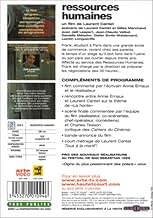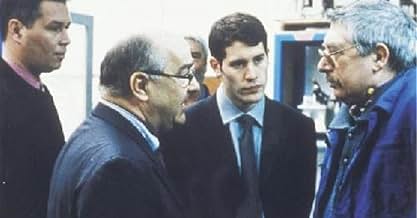Aggiungi una trama nella tua linguaThe 35-hour work week has all of France in its thrall. This film turns it into a feature about economic and familial politics. Frank, a business school graduate, returns to his provincial ho... Leggi tuttoThe 35-hour work week has all of France in its thrall. This film turns it into a feature about economic and familial politics. Frank, a business school graduate, returns to his provincial hometown to take a management position in the factory where his father has been working for ... Leggi tuttoThe 35-hour work week has all of France in its thrall. This film turns it into a feature about economic and familial politics. Frank, a business school graduate, returns to his provincial hometown to take a management position in the factory where his father has been working for 30 years. First Frank makes the mistake of actually asking the workers on the assembly lin... Leggi tutto
- Regia
- Sceneggiatura
- Star
- Premi
- 19 vittorie e 5 candidature totali
- Alain
- (as Didier Emile-Woldemard)
Recensioni in evidenza
Laurent Cantet's first film, Human Resources, shows the dehumanizing effect of mechanical labor on the relationship between a father and his son in rural France. The film has a strong political message but never feels sterile or preachy; rather it is a deeply felt human drama about class mobility. Jalil Lespert, the only professional actor in the cast, is Franck Verdeau, a young, handsome intern who works for the same company in which his father (Jean-Claude Vallod) has toiled for thirty years. Mr. Verdeau is a heavy-set taciturn individual who operates an automatic welding device that forces him to stand on his feet all day, bent over his machine and proudly claims that he can churn out 700 parts per hour. A member of the old school who does not believe in upsetting the bosses, the father is more compliant than most workers who still operate within the system but express their misgivings in union activity.
Franck has just returned home from school in Paris. Eager to seize upon the opportunity presented to him through his father's sacrifice, he seeks to impress management and launch his career by assessing the validity of instituting a 35-hour workweek. Although he has made a good first impression on his shrewd boss (Lucien Longueville), he soon comes into conflict with union leaders who are fearful that reducing the amount of hours will lead to automation and loss of jobs. Torn between his professional obligations and his sympathies for the workers, Franck naively proposes a referendum of the workers on the issue. This plays into the hands of management seeking to drive a wedge between the workers and their union, led by firebrand activist, Danielle Arnoux (Danielle Melador).
Arnoux, a real-life left-wing union activist, is an aggressive and uncompromising leader who does not hesitate to let management know exactly where she stands. When more layoffs seem to be forecast including that of his own father, Franck must choose sides between the militants and the father who made his job and career possible. Mr. Verdeau is opposed to the union and cannot see any benefit from a staggered workweek that would mean increased leisure. Their final confrontation about the father's passivity brings to the surface resentments about his father's social class that have been repressed for many years.
Human Resources is shot inside an actual factory, creating an authenticity furthered by its cast of actual factory employees. I found myself deeply involved with the characters. In tackling an issue that Hollywood has stayed miles away from, Cantet has made us aware of the daily drudgery of millions of people around the world for whom compromise and submission is a way of life. The film never loses his focus, striking a balance between social relevance and a character study of deeply conflicted individuals whose work is reflected in their self-image. Cantet said in an interview, "The title Human Resources is a reaction against the cynicism of that expression. A human being is administered the same way you would administer stocks or capital. I wanted to play on that double meaning and go beyond coded administrative lingo in order to talk about an actual human's resources." He has succeeded impressively.
By Blake French:
The powerful, heartbreaking new French drama "Human Resources," written by Laurent Cantet and Gilles Marchand, is so authentic the only true professional actor in the cast is Jalil Lespert, who plays Franck, the son of a workaholic. The rest of the performers were chosen from unemployment organizations in regard to the business the characters would have to play. "The title "human resources" is first of all a reaction against the cynicism of that expression," explains director Laurent Cantet in an interview. "A human being is administered the same way you would administer stocks or capital." After watching this film we understand what he means by those words.
The working characters employed by a personnel division factory where Franck's dad is currently employed. He has been working there for thirty years and is happier when his son is emotionally further apart from him. Franck has defied his family heritage, went to college, and has recently returned to the French home where his parents live. He gets a job as a manager at the company in which his father works. This is where he becomes torn between business opportunities and staying loyal to his principles of fairness and morality. The people at the factory treat the workers like machines, and it is then when he understands "human resources" refers to people as variables in the production flow graphs.
Director Laurent Cantet is not from a working class family, as cleared up in a press kit, so these skillful and wise foreign filmmakers decided to get ideas confirmed by those who did live that life. The parts of the factory workers are played by actual workers; the boss is a real boss; the union leader is a real union leader. The film is also shot in an authentic working factory, as if a documentary was in the creation. Cantet was absolutely correct: who better to imitate the positions and postures of a worker's body bent over a factory machine, or especially the language itself, much of which was selected the workers themselves. The factory's supervisors are cutting back, and Franck gets the privilege of listening to the suggestions that a recent questionnaire asks. The questionnaire is to help make the employers, who are drained of most consciousness on the job, feel they are important to the success of the corporation. Then, while snooping around on the boss's computer, Franck finds the questionnaire is nothing but a pretense for upcoming layoffs, that of which his father is on the list. While Franck is furious at the deceptions, his father refuses to even go on strike after learning of his fate-he is simply to used to consistence and routine, he fears change.
The movie is more about the inner struggle between Franck and his father than the actual protesting by the employees or how the factory supervisors fight back. American movies are not often about factory workers, and when they are, the subject is more parody, like in "Officer Space" (1999), than class struggle. One of the best arguments this movie makes is that class struggle is still alive today, and has a high impact of various societies. There are other themes in "Human Resources": greed and power, communication between Franck and his family, the father-son association he has with his boss, finding one's place in society, and shame and regret.
"Human Resources" is of the most penetrating films of the year; it offers descriptive writing and empathizing characters. Shot in a documentary style, the direction is focused and sincere, and the performances are mesmerizing. The only thing keeping it from perfection is the somewhat slow-moving script that occasionally strays idle when some of the most important events take place. Beyond that, however, "Human Resources" is a must-see if you are a fan of original, reality theme-based dramas.
Lo sapevi?
- QuizSame script structure as Oliver Stone's "Wall Street".
- Colonne sonoreQuatuor N°13 en la mineur
Composed by Franz Schubert
Performed by Melos Quartett (as Melos Quartet)
Published by Harmonia Mundi
I più visti
Dettagli
- Data di uscita
- Paesi di origine
- Sito ufficiale
- Lingua
- Celebre anche come
- Human Resources
- Luoghi delle riprese
- Aziende produttrici
- Vedi altri crediti dell’azienda su IMDbPro
Botteghino
- Lordo Stati Uniti e Canada
- 116.866 USD
- Fine settimana di apertura Stati Uniti e Canada
- 29.526 USD
- 17 set 2000
Contribuisci a questa pagina























